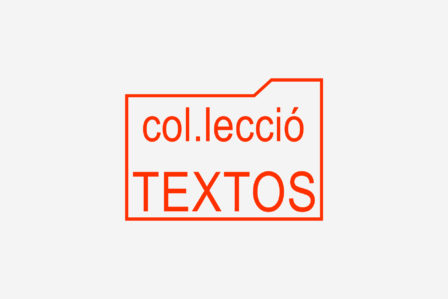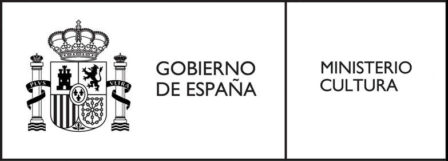Presentation of Hangar’s Collection of Texts

On Tuesday, June 25, we will present the Collection of Texts, a new program by Hangar focused on generating a repository of monographic texts on artists. It is an editorial device through which artists can have a long and core text about their work that includes the way of doing and thinking holistically, weaving together different projects to build an overall vision. The Text Collection offers artists the possibility of establishing a writing link with an external perspective as a starting point, not as a result of a project or exhibition.
Each of the resident artists has had the opportunity to commission a text about their work from an author of their choice, along with editorial accompanyment from Hangar. These authors are state or international professionals of recognized prestige and experience. The Collection, published in a trilingual digital platform, edited and designed to be recognizable as precisely that, a collection, responds to the desire to support artistic careers by providing a resource for the presentation and dissemination of practices particularly oriented towards internationalization. The intention is to give rise to publications with agile circulation that have a long life and that contribute to expanding the networks of artistic practices.
In 2023, we initiated the –not public– phase of exploration, testing, and launch of the Collection of Texts, which has allowed us to test the working hypotheses that drove its conception. We started from the observation that in the field of contemporary art, publishing and writing occur when there is an exhibition, leaving out processes or languages that do not crystallize in an exhibition. Artists have to wait for an exhibition context to publish and work with an external perspective of their choice. When this happens, these texts are usually specifically linked to the contents of that particular exhibition or project, limiting the scope of what is included in the writing. Publications end up being small fragments in the continuum of artistic production, unless there is a retrospective exhibition. It was also among the initial observations that for many artists, the leap to internationalization does not occur because there is no comprehensive and translated text of their work that allows them to present, contact, or apply.
In parallel, the numerous conversations held with the authors have opened a tessitura of transitive listening where we have been able to gauge the current state of art criticism in Spain. The Collection echoes the transition from a more traditional and academic practice to one that embraces experimentation and interdisciplinarity. The texts it comprises exercise a conception of writing as an emancipatory space, which drives the reconfiguration of artistic practices and reflects the changing nature of the artistic landscape. Thus, the Collection is also a way to contribute to the development of written art criticism and to value intellectual production at a time when we are witnessing its devaluation and precarization. We speak of the recognition of writing, not as a subsidiary task to artistic practice, but as a creation praxis in its own right.
We understand the Collection as an editorial interface that proposes an approach as proactive as it is reflective: it puts into practice new forms of publishing with the aim of restoring the transformative power of writing. Even in the artistic realm, we observe a certain stagnation in writing forms. Criticism is – or should be – an exercise in continuous revision, always discussed in terms of its function and boundaries. It is an indispensable part of the phenomena that articulate a context, presenting and commenting on them upon publication. Therefore, we must grant it the space, time, and conditions that allow for the revision and regeneration of the records of written intellectual production.
The Collection is born out the conviction that the possibility of activating political imagination, of daring to imagine other worlds, involves mobilizing other ways of enunciating, of naming. We insist on writing as an epistemic environment to illuminate and articulate other forms of sensibility, actively contributing to the understanding of artistic production in relation to other disciplines as a space for enunciation and a unique capacity for re-action.
For this first public opening of the Collection, we are fortunate to have two of its authors. We will share a dialogue with Martí Manen, Laura Vallés, along with Paula García-Masedo, former resident artist, as well as Anna Manubens, director of Hangar, and Carolina Jiménez, responsible for research and support programs at Hangar.
Practical Information
Date: Tuesday, June 25
Venue: IF Publications, Baixada de Viladecols 3, Barcelona.
Time: 7 p.m.
Free entry
Laura Vallés Vílchez works as a curator, editor, and researcher. She studied a degree in Fine Arts and a Master’s in Photography at the Polytechnic University of Valencia, an experience that led her to undertake a placement at Northumbria University, Newcastle upon Tyne, between both degrees. In 2022, she earned a PhD at the Royal College of Art in London, where she resides, teaches curating, and led the European project 4Cs From Conflict to Conviviality through Creativity and Culture. Her pedagogical work began with a grant from the Fundación Botín and is enriched by her role as co-founder and editor of Concreta: a publishing house that releases a magazine as well as a series of books, and which builds on previous experiences, always in institutions that straddle pedagogical and public realms. This is the case of Afterall in London, an editorial organization linked to Central Saint Martins, where she worked in 2009, before moving to the MoCP at Columbia University in Chicago in 2010. As a curator, she has organized exhibitions such as Te toca a ti (EACC, 2018), 15.600 días. Xisco Mensua (CCCC, 2019), A través de la arena (Azkuna Zentroa, Artium, and CentroCentro, 2019-20), Mitos del futuro próximo (Fotonoviembre, TEA, 2019-20), Teresa Lanceta: Tejer como código abierto (MACBA-IVAM, 2022-23) or Larruak eta izurrak (Tabakalera, 2024). She has given lectures at institutions such as the Royal Academy of Arts, SOAS, University of Granada, or UPV, and has translated authors including Isabelle Stengers, Donna Haraway, Moyra Davey, and Paul B. Preciado.
Martí Manen (Barcelona, 1976) is the director of Index – The Swedish Contemporary Art Foundation in Stockholm, where he resides. He has curated exhibitions at the Museo de Historia Natural (Mexico City), Aara (Bangkok), Tabakalera (San Sebastián), Konsthall C (Stockholm), CA2M (Madrid), and the Fundació Miró (Barcelona). Martí Manen was the curator of the Spanish Pavilion at the Venice Biennale in 2015 and was the curator of Momentum10 (Biennale in Moss, Norway, 2019). In the 1990s, he curated five years of exhibitions in his bedroom in a student apartment in Barcelona. Manen has published books such as Leaving the Exhibition (Consonni), Telling Everything Without Knowing How (CA2M), and When Lines Are Time (Fundació Miró).
Paula García-Masedo is an artist. Her research addresses, through sculptural language, the relationships between territories and material cultures, contributing to the construction of situated genealogies. It unfolds without anticipating a resulting image, based on operating forms that result from recognizing how matter tends to configure itself. She studied the Independent Studies Program at MACBA and Architecture at the Polytechnic University of Madrid. Her work has been presented at CA2M (Madrid), Casa Encendida (Madrid), TEA (Santa Cruz de Tenerife), CentroCentro (Madrid), Blueproject Foundation (Barcelona), and Fabra i Coats (Barcelona), among others. She co-founded and co-directed the independent space Pols (Valencia) until 2022. She has curated exhibitions at CentroCentro (Madrid), the galleries LIGA DF (Mexico City) and Monoambiente (Buenos Aires), and the Official College of Architects of Madrid. She has published two books with Caniche Editorial.
This program is kindly supported the Ministry of Culture and Institut Ramon Llull


Categories: Agenda Hangar |
